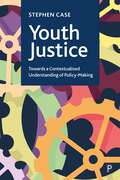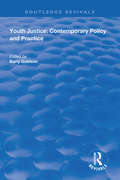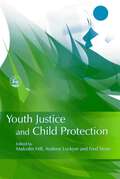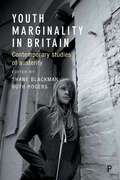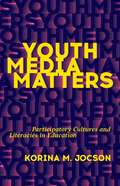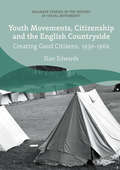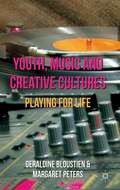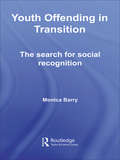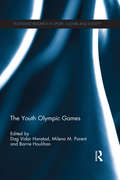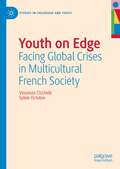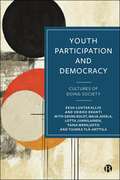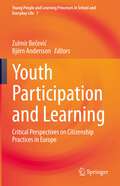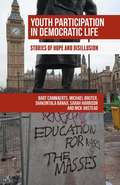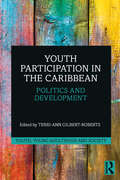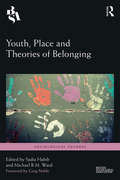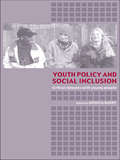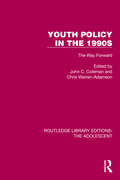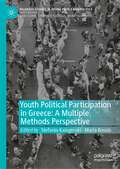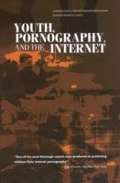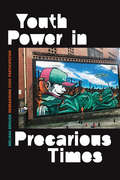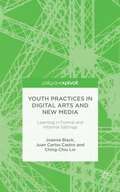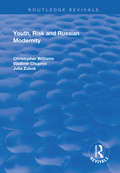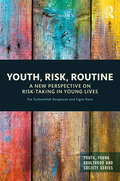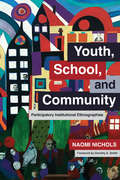- Table View
- List View
Youth Justice: Towards a Contextualised Understanding of Policy-Making
by Stephen CasePolicy development and implementation has a pivotal role in the youth justice system, profoundly impacting professionals and the children they work with. This imaginative book challenges limited explanations of policy-making as linear and government-dominated through original research into the practices, identities and relationships of a wide range of stakeholders working in multiple policy- making contexts in England and Wales. The result is a detailed expert analysis of the contexts and mechanisms of youth justice policy-making. This book is key reading for researchers, professionals and students seeking effective understandings and responses to the long term social problem of youth offending.
Youth Justice: Contemporary Policy and Practice (Routledge Revivals)
by Barry GoldsonPublished in 1999, the aim of this text is to offer a critical analysis of contemporary policy and practice in relation to children and crime. It provides an integrated edited text combining a critical commentary of contemporary social/criminal justice policy with analyses of progressive practice in the UK. It offers coverage of each discrete stage in the processing of "child offenders" in the criminal justice system. It develops an alternative policy and practice framework drawing on experience from the UK, Europe, the USA, Canada, Australia and New Zealand.
Youth Justice and Child Protection
by Malcolm Hill Andrew Lockyer Fred StoneThis book is an examination of recent developments in the areas of youth justice and child protection. It investigates how well young people and the societies in which they live are served by judicial and service systems. Consideration is given to those in care - in young offenders' institutions, foster families and residential homes - as well as those living with their families. A broad range of international experts discuss the largely segregated youth justice and children's legal and service systems in England and Wales, other parts of Western Europe and the US, and compare these with Scotland's integrated system. The implications of these arrangements are considered for the rights of children and parents on the one hand and society on the other. The contributors also provide insights into the rationale for current and proposed policies, as well as the efficacy of different systems. This book will be an important reference for policy-makers, social workers, lawyers, magistrates and equivalent decision makers, health professionals, carers, and all those working in youth justice and child protection. It is highly relevant for academics and students interested in children, citizenship, youth crime, child welfare and state-family relations.
Youth Marginality in Britain: Contemporary Studies of Austerity
by Shane Blackman and Ruth RogersTabloid headlines such as ‘Anti-social Feral Youth,’ ‘Vile Products of Welfare in the UK’ and ‘One in Four Adolescents is a Criminal’ have in recent years obscured understanding of what social justice means for young people and how they experience it. Youth marginality in Britain offers a new perspective by promoting young people’s voices and understanding the agency behind their actions. It explores different forms of social marginalisation within media, culture and society, focusing on how young people experience social discrimination at a personal and collective level. This collection from a wide range of expert contributors showcases contemporary research on multiple youth deprivation of personal isolation, social hardship, gender and ethnic discrimination and social stigma. With a foreword from Robert MacDonald, it explores the intersection of race, gender, class, asylum seeker status and care leavers in Britain, placing them in the broader context of austerity, poverty and inequality to highlight both change and continuity within young people’s social and cultural identities. This timely contribution to debates concerning youth austerity in Britain is suitable for students across youth studies, sociology, education, criminology, youth work and social policy.
Youth Media Matters: Participatory Cultures and Literacies in Education
by Korina M. JocsonIn an information age of youth social movements, Youth Media Matters examines how young people are using new media technologies to tell stories about themselves and their social worlds. They do so through joint efforts in a range of educational settings and media environments, including high school classrooms, youth media organizations, and social media sites. Korina M. Jocson draws on various theories to show how educators can harness the power of youth media to provide new opportunities for meaningful learning and “do-it-together production.” Describing the impact that youth media can have on the broader culture, Jocson demonstrates how it supports expansive literacy practices and promotes civic engagement, particularly among historically marginalized youth.In Youth Media Matters, Jocson offers a connective analysis of content area classrooms, career and technical education, literary and media arts organizations, community television stations, and colleges and universities. She provides examples of youth media work—including videos, television broadcasts, websites, and blogs—produced in the San Francisco Bay Area, Los Angeles, New York, and St. Louis. At a time when educators are increasingly attentive to participatory cultures yet constrained by top-down pedagogical requirements, Jocson highlights the knowledge production and transformative potential of youth media with import both in and out of the classroom.
Youth Movements, Citizenship and the English Countryside: Creating Good Citizens, 1930-1960 (Palgrave Studies in the History of Social Movements)
by Sian EdwardsThis book explores the significance and meaning of the countryside within mid-twentieth century youth movements. It examines the ways in which the Boy Scouts, Girl Guides, Woodcraft Folk and Young Farmers' Club organisations employed the countryside as a space within which 'good citizenship' - in leisure, work, the home and the community - could be developed. Mid-century youth movements identified the 'problem' of modern youth as a predominantly urban and working class issue. They held that the countryside offered an effective antidote to these problems: being a 'good citizen' within this context necessitated a respectful and mutually beneficial relationship with the rural sphere. Avenues to good citizenship could be found through an enthusiasm for outdoor recreation, the stewardship of the countryside and work on the land. However, models of good citizenship were intrinsically gendered.
Youth, Multiculturalism and Community Cohesion
by Paul ThomasSince the 2001 'race riots' in the north of England, and the 7/7 London bombings, Britain has appeared to reject multiculturalism. It has instead prioritized a new policy of 'Community Cohesion' that calls for a focus on common needs and shared British identity, rather than on ethnic and religious differences. This has proved a controversial agenda, apparently downplaying the reality of racism and ethnic diversity, and leading to one critic calling it 'the death of multiculturalism'. Little evidence has emerged so far on what Community Cohesion actually represents, but this book addresses that deficit by drawing on empirical research around work with young people to analyse the meaning and practice of British Community Cohesion policies, youth identities in racially-tense areas, and government's attempts to 'prevent violent extremism' amongst young Muslims. It concludes that Community Cohesion is a new phase of multiculturalism, not its death.
Youth, Music and Creative Cultures
by Geraldine Bloustien Margaret PetersYouth, Music and Creative Cultures demonstrates the power of music in the lives of many disadvantaged youth. It offers an evocative cross-cultural exploration into the everyday lives and music practices of young people from seven very different urban locales in Australia, the UK, the US and Europe. They document their passion for music from their own broad social, cultural and ethnic perspectives, using their own video and camera footage to reflect on their learning processes and music activities. These narratives, alongside the views and observations of their peers and mentors, are presented in a dialogic format that both supports and challenges the views and analysis of the authors.
Youth Offending in Transition: The Search for Social Recognition
by Monica BarryTaking a new approach to youth crime, this book argues that the transition from childhood to adulthood can be an isolating and disempowering experience for young people. Children and young people are inherently vulnerable because of their age and status – they are a minority group, with the potential for being exploited, discriminated against, dominated and disrespected by adults. Youth Offending in Transition explores how their treatment by adult society may lead young people to resort to crime as a means of gaining respect from their peers. Using concepts of capital and the narratives of young offenders themselves, this book is based on original research into the reasons why young people start and stop offending. It discusses the following topics: criminal theory and the significance of youth transitions to the ‘age-crime curve’ social identity and reputation amongst young people social inequalities and their influence on youth transitions the criminalization and discrimination of young people by adults the importance of social recognition in reducing offending.
The Youth Olympic Games (Routledge Research in Sport, Culture and Society)
by Barrie Houlihan Milena M. Parent Dag Vidar HanstadThe first summer Youth Olympic Games (YOG) were held in Singapore in 2010 and the first winter Youth Olympic Games in Innsbruck in 2012. The IOC hopes that the YOG will encourage young people to be more active and that they will bring the Olympic movement closer to its original founding values. This is the first book to be published on the Youth Olympic Games. It critically examines the origins of the Games and the motives of the Games organisers, as well as the organisation and management of the Games and their wider impact and significance. The first part of the book discusses the relationship between the YOG and the ideology of Olympism, in the context of broader developments in youth sport competitions. The second part investigates a wide range of managerial aspects including the bidding process, finance, the prominent role of young people on the organising committees and as volunteers, the role of media and sponsors, and the distinctive competition structure. The final part of the book assesses the current and likely future impact of the YOG on the host cities and countries, the IOC and on national youth sport policies. The Youth Olympic Games is essential reading for any researcher, advanced student or policy maker with an interest in Olympic Studies, sports development, sport policy, youth sport or event management.
Youth on Edge: Facing Global Crises in Multicultural French Society (Studies in Childhood and Youth)
by Vincenzo Cicchelli Sylvie OctobreThis book explores disrupted youth cohesion in France within the context of multiple ongoing global economic, migratory, social, political, and security-related crises. While these trends can be observed in numerous Western societies, France provides a unique case study of various anti-cosmopolitan and anti-Enlightenment movements shaping youth conditions and reconfiguring relationships between the individual, the group, and society. The authors undertook in-depth interviews with French young people between the ages of 18 to 30 years old to inquire into how they experience "vivre ensemble" (living together) in a time of rising economic inequalities and multicultural tensions. Through these findings, they invite decision-makers, politicians, educators, and parents to propose a renewed narrative of social cohesion for youth who are not disillusioned, but deeply on edge.
Youth Participation and Democracy: Cultures of Doing Society
by Eeva Luhtakallio Veikko ErantiHow do young people participate in democratic societies? This book introduces the concept of ‘doing society’ as a new theory of political action. Focused on Finnish youth, it innovatively blends cutting-edge empirical research with agenda-setting theoretical development. Redefining political action, the authors expand beyond traditional public-sphere, scaling from formal to informal and unconventional modes of engaging. The book captures diverse engagement from memes to social movements, from participatory budgeting to street parties and from sleek politicians to detached people in the margins. In doing so, it provides a holistic view of the ways in which young people participate (or do not participate) in society, and their role in cultural change.
Youth Participation and Learning: Critical Perspectives on Citizenship Practices in Europe (Young People and Learning Processes in School and Everyday Life #7)
by Zulmir Bečević Björn AnderssonThis book contributes to the studies on learning processes occurring outside “traditional” socialization settings such as family and school, by analysing civic and political participation and learning experiences. In this perspective, the book delves into the connections between the concepts of learning and participation and, in various ways and from different perspectives, critically interrogates learning and participation as interrelated phenomena, with the aim of revealing complexities implicated in pathways to adulthood. Being interdisciplinary in its nature (contributors come from disciplinary backgrounds such as educational sciences, child and youth studies, social work, sociology and political science), the volume provides an up-to date analysis of contemporary issues connected to youth participation and learning. The work taps into central areas of everyday life of young people and youth meaning-making and generates and presents qualitative knowledge about what it means to be young in Europe today.
Youth Participation in Democratic Life: Stories of Hope and Disillusion
by Bart Cammaerts Michael Bruter Shakuntala Banaji Sarah Harrison Nick Anstead Whitwell ByrtThis book is concerned with the contexts, nature and quality of the participation of young people in European democratic life. The authors understand democracy broadly as both institutional politics and civic cultures, and a wide range of methods are used to analyse and assess youth participation and attitudes.
Youth Participation in the Caribbean: Politics and Development (Youth, Young Adulthood and Society)
by Gilbert-Roberts, Terri-AnnCritically examining narratives of participation in governance and development, this volume adds Caribbean voices and experiences to the global discourse on youth participation. The essays provide empirical case studies of institutions, practices and processes of youth engagement in the politics of Caribbean development, orienting the reader to the political culture of the Caribbean and the position of youth within small societies. Covering experiences at intergovernmental, national and local levels, as well as formal and informal modes of participation, it examines how young people have organised themselves or have been organised to engage with the state and with community agents in politics, public policy and activism. It illustrates the heterogeneity of youth political participation, employing multi- disciplinary, multi- level and mixed- method analyses from the fields of demography, political science, social policy, development studies and youth development. Critical themes addressed include regional governance, democratic representation, online engagement, local governance and community development. In exploring these themes, the book discusses the legitimacy and inclusiveness of governance in relation to age, gender, race, geography and socio-economic status. The findings will be useful to students, researchers and policymakers alike who are keen to improve governance and contribute to inclusive sustainable development in the Caribbean.
Youth, Place and Theories of Belonging (Sociological Futures)
by Sadia Habib Michael R. M. Ward Greg NobleDrawing on interdisciplinary perspectives, Youth, Place and Theories of Belonging showcases cutting-edge empirical research on young people’s lifeworlds. The scholars demonstrate that belonging is personal, infused with individual and collective histories as well as interwoven with conceptions of place. In studying how young people adapt to social change the research highlights the plurality of belonging, as well as its temporal and fleeting nature. In the field of youth studies, we have seen a recent emphasis on studying the ways youth live out everyday multiculturalisms in an increasingly globalised world. How young people negotiate belonging in everyday life and how they come to understand their positions in fragmented societies remain emerging areas of scholarship. Composed of twelve chapters, the collection references key sites and institutions in young people’s lives such as schools, community/cultural centres, neighbourhoods and spaces of consumption. Drawing from diverse areas such as the rural, the urban as well as displacements and mobilities, this international collection enhances our understanding of the theories employed in the study of youth identity practices. Written in a direct and clear style, this collection of essays will be of interest to researchers working in geography, theories of affect, gender, mobility, performativities, and theories of space/place. Investigating how young people come to belong can open up new spaces and provide critical insights into young people’s identities.
Youth Policy and Social Inclusion: Critical Debates with Young People
by Monica BarryTaking a holistic and multidisciplinary approach this book identifies and analyzes the factors which promote or discourage social inclusion of young people in today’s society. It critically examines the discriminatory attitudes towards young people, and focuses on the 'problem' of adults rather than the 'problem' of young people themselves. The authors ask searching questions about society's capacity and willingness to be more socially inclusive of young people in terms of policy and practice, and explore the extent to which young people have access to status, rights and responsibilities as young adults. Challenging existing theory the book covers issues including: citizenship, education, rights, youth transactions, drug use, homelessness, teenage pregnancy and unemployment. Incorporating the views and experiences of young people themselves, the book highlights the strengths and weaknesses of the academic contribution and suggests ways forward for a more inclusive society.
Youth Policy in the 1990s: The Way Forward (Routledge Library Editions: The Adolescent)
by Chris Warren-Adamson John C. ColemanDespite its importance, youth policy is an often-ignored area of Government planning and legislation, and policy initiatives seem to lack any guiding theme or relevance to the needs of young people. In Youth Policy in the 1990s originally published in 1992, the editors brought together prominent experts in the key areas of youth policy at the time. They provide a critical review of the major issues which implicitly or explicitly affect the world of adolescents and examine to what extent they paint a picture of existing youth policy. The aim was to provide a baseline for a policy on youth in the 1990s. The book recommends the introduction of a Minister for Young People and the use of youth impact statements at national and local level and seeks to provide information and argument for those seeking to plan policy for young people from a corporate or inter-agency perspective. The contributors are all recognized experts in their fields. They tackle their topic first by examining the historical perspective, with a special concentration on the previous decade. Each has paid regard to particular themes – ethnicity, class and gender, and where possible, has brought in material from other countries and cultures. They have then put forward suggestions for future policy.
Youth Political Participation in Greece: A Multiple Methods Perspective (Palgrave Studies in Young People and Politics)
by Stefania Kalogeraki Maria KousisThe overarching aim of this edited volume is to investigate different modes, patterns and determinants of youth political participation in Greece, since the economic crisis, by incorporating a variety of quantitative and qualitative methods. The chapters examine different forms of youth political participation, from institutionalized (such as voting, or membership in political parties) to non-institutionalized (such as signing petitions, protesting through demonstrations or occupations, and political consumerism). Moreover, the chapters shed light on diverse aspects of youth political participation, such as the interlinkages between occupational precarity and political behaviour, the spatial portrait of youth political engagement in rural, suburban and urban Greek contexts, the engendered aspects of political involvement, the pivotal role of protest events in youth political socialization and in mobilization in contentious political actions, the different impacts of priming inequality on youth’s political beliefs, depending on different modes of thinking, as well as the key features of youth-related and youth-led (non-state) organisations operating in Greece. The aforementioned aspects are examined at the micro, meso or/and macro level through distinct methodological approaches including panel survey, experimental survey, biographical interviews, in-depth interviews and action organization analysis, carried out in the context of the EURYKA (European Commission) project.
Youth, Pornography, And The Internet
by Committee to Study Tools Strategies for Protecting Kids from Pornography Their Applicability to Other Inappropriate Internet ContentThe Internet has changed the way we access the world. This is especially true for kids, who soak up new technologies like eager little sponges. They have access to an enormous array of material, including educational links, sports info, chat rooms—and, unfortunately, pornography. But we must approach our need to protect children with care to avoid placing unnecessary restrictions on the many positive features of the Internet. Youth, Pornography, and the Internet examines approaches to protecting children and teens from Internet pornography, threats from sexual predators operating on-line, and other inappropriate material on the Internet. The National Research Council’s Computer Science and Telecommunications Board explores a number of fundamental questions: Who defines what is inappropriate material? Do we control Internet access by a 17-year-old in the same manner as for a 7-year-old? What is the role of technology and policy in solving such a problem in the context of family, community, and society? The book discusses social and educational strategies, technological tools, and policy options for how to teach children to make safe and appropriate decisions about what they see and experience on the Internet. It includes lessons learned from case studies of community efforts to intervene in kids’ exposure to Internet porn. Providing a foundation for informed debate, this very timely and relevant book will be a must-read for a variety of audiences.
Youth Power in Precarious Times: Reimagining Civic Participation
by Melissa BroughDoes youth participation hold the potential to change entrenched systems of power and to reshape civic life? In Youth Power in Precarious Times Melissa Brough examines how the city of Medellín, Colombia, offers a model of civic transformation forged in the wake of violence and repression. She responds to a pressing contradiction in the world at large, where youth political participation has become a means of commodifying digital culture amid the ongoing disenfranchisement of youth globally. Brough focuses on how young people's civic participation online and in the streets in Medellín was central to the city's transformation from having the world's highest homicide rates in the early 1990s to being known for its urban renaissance by the 2010s. Seeking to distinguish commercialized digital interactions from genuine political participation, Brough uses Medellín's experiences with youth participation—ranging from digital citizenship initiatives to the voices of community media to the beats of hip-hop culture—to show how young people can be at the forefront of fostering ecologies of artistic and grassroots engagement in order to reshape civic life.
Youth Practices in Digital Arts and New Media: Learning in Formal and Informal Settings
by Joanna Black Juan Carlos Castro Ching-Chiu LinThe authors examine youths' practices in digital culture affecting social change, pedagogy, and creative learning practices. Knowledge about these practices is discussed, in which learning, knowledge sharing, distinct social contexts, pedagogical relationships, and artistic creative inquiry are examined in diverse formal and informal environments.
Youth, Risk and Russian Modernity
by Christopher Williams Vladimir ChuprovTitle first published in 2003. This timely and original book is the most comprehensive and authoritative analysis of Russia's risk society to date. Referring to the works of Douglas, Beck and Giddens, it considers a variety of theories of risk and applies them to young people in different risk societies, showing how these youngsters have adapted to cope with risk.
Youth, Risk, Routine: A New Perspective on Risk-Taking in Young Lives (Youth, Young Adulthood and Society)
by Tea Torbenfeldt Bengtsson Signe RavnYoung people’s lives continue to be the topic of public scrutiny and recurring ‘moral panics’. Smoking cannabis, speeding, and engaging in street-level fights are depicted as activities based on ‘poor choices’ or simple hedonism, putting young people’s futures at risk. Based on comprehensive, qualitative research with young people in Denmark, this book illustrates how such individualised accounts miss out on the inherently social character of risk-taking activities. Youth, Risk, Routine introduces a new approach to risk-taking activities as being an integral and routinised part of young people’s everyday life. By applying social theories of practice, this insightful volume presents a framework for understanding the routinised dimensions of young people’s engagement in risk-taking and how this is embedded in, intertwined with, and held in place by other everyday practices. Indeed, through extensive empirical analyses of the rich material at hand, the authors explore how routinisation, coordination, embodiment, and social context are central aspects for understanding how, why, and when young people engage in risk-taking practices. Youth, Risk, Routine will be of interest to students and scholars in sociology, criminology, and social work as well as wider social science audiences, particularly those interested in exploring the empirical potential of social theories of practice.
Youth, School, and Community: Participatory Institutional Ethnographies (G - Reference, Information And Interdisciplinary Subjects Ser.)
by Naomi NicholsUnlike other books about youth, this book examines how young people’s experiences of inclusion and exclusion are shaped by extended social relations, coordinating thought and conduct across time and space. Working with young people, using a range of participatory institutional ethnographic strategies, this book investigates the social and institutional relations which differentially punctuate our lives. While research began with what young people know and have experienced, this starting place anchors an investigation of public sector institutions and institutional processes that remain implicated in social-historical-economic processes of global capitalism, imperialism, and colonialism. Youth, School, and Community connects the dots between the abstract objectified accounts produced by institutions and enabling institutional action and accounting practices, and the actual material conditions of young people’s lives and development, which these accounts obscure. By focusing on specific policies and procedures that produce young people’s experiences of racialized inclusion/exclusion, safety/risk make it particularly useful to academics, professionals, and activists who want to ensure that young people experience equitable access to public sector resources and not disproportionate exposure to public sector punishments and punitive interventions.
